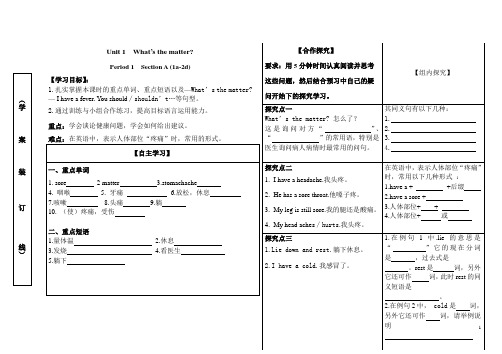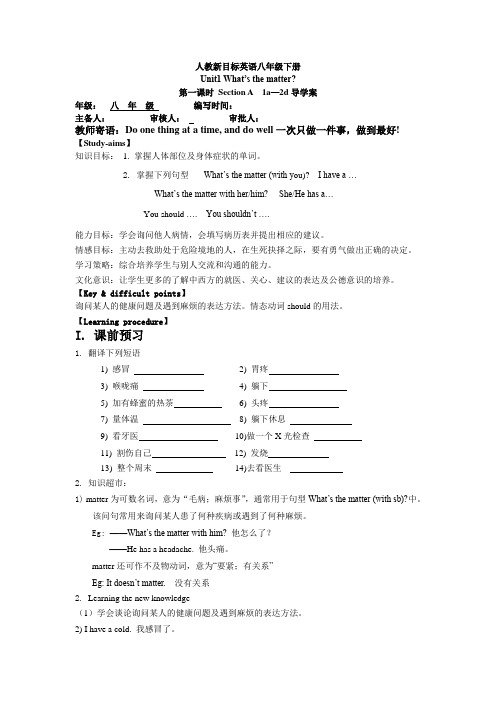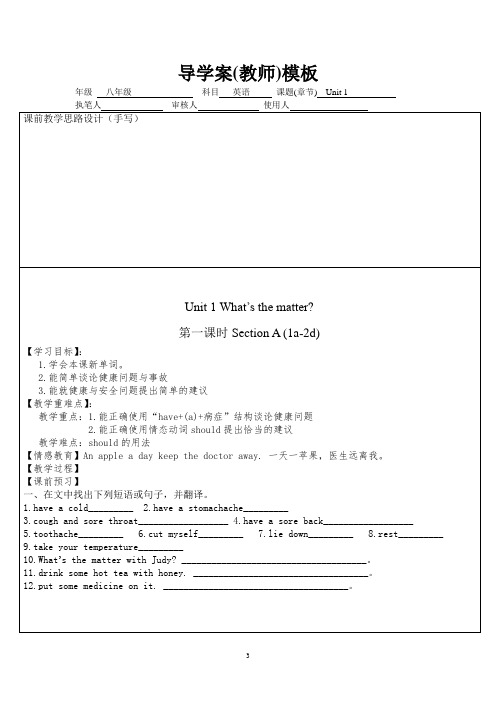八年级(下)英语学科导学案Unit1A
- 格式:doc
- 大小:49.00 KB
- 文档页数:4

Unit1 What’s the matter?Section A (1a-2d)【知识细目】1. What’s the matter?怎么了?= What’s wrong? = What’s the trouble ?询问对方遇到什么问题,后可接with sb. /sth. , “某人/某物怎么了”。
Eg: 你怎么了?What’s the matter _______ _______?感冒have 表示“得. . . 病,患. . . 病”,结构为:have + a + 病症Eg: 发烧______________________ 咳嗽_____________________3. have a stomachache 胃疼;肚子疼复合名词stomachache = stomach(胃,腹部) + ache(疼痛)由-ache构成的复合名词还有:背疼________ 头疼__________牙疼_________①lie②rest v. 休息n. 休息have/take a rest /rests休息一下have /take a goodrest 好好休息Eg: 让我们停下工作,休息一下。
Let’s stop working and _________________.5. You need to take breaks away from the computer.需要做某事need to do sth.6. take one’s temperature 量体温7. without 介词意为“没有” 后接动词ing或者名词/代词反义词:with 有;带有【导学过程】一、课前预习1. 怎么了?__________________2. 感冒____________________3. 胃疼___________________4. 背疼___________________5. 讲太多_________________6. 喝足够的水_____________7. 嗓子疼_________________8. 割伤我自己_____________9. 躺下休息_______________10. 喝些加蜂蜜的__________11. 看牙医________________12. 拍X光片___________13. 量体温______________14. 敷一些药_____________15. 发烧_________________16. 头疼_________________17. 休息_________________18. 坐太久_______________19. 以同样的方式_________20. 没有移动_____________21. 去看医生_____________二、课中研讨语法探究:1. What should I do? Should I take my temperature?should 是_______动词,后接动词_____.否定在should后加_____,变一般疑问句should________.Eg: He should lie down and rest.否定句:They _________lie down and rest.一般疑问句:______ they lie down and rest? Yes, ___ ____. /No, _____ ____【拓展延伸】1.sore adj. 疼痛的,酸痛的指因发炎引起的疼痛eg: 背疼have a _______ _______ 嗓子疼_____________________2. ache常与身体部位构成复合名词,指某部位疼痛。


人教新目标英语八年级下册Unit1 What’s the matter?第一课时Section A 1a—2d导学案年级:八年级编写时间:主备人:审核人:审批人:教师寄语:Do one thing at a time, and do well一次只做一件事,做到最好! 【Study-aims】知识目标:1. 掌握人体部位及身体症状的单词。
2. 掌握下列句型--- What’s the matter (with y ou)?---I have a …--- What’s the matter with her/him? ---She/He has a…You should …. You shouldn’t ….能力目标:学会询问他人病情,会填写病历表并提出相应的建议。
情感目标:主动去救助处于危险境地的人,在生死抉择之际,要有勇气做出正确的决定。
学习策略:综合培养学生与别人交流和沟通的能力。
文化意识:让学生更多的了解中西方的就医、关心、建议的表达及公德意识的培养。
【Key & difficult points】询问某人的健康问题及遇到麻烦的表达方法。
情态动词should的用法。
【Learning procedure】I. 课前预习1. 翻译下列短语1) 感冒2) 胃疼3) 喉咙痛4) 躺下5) 加有蜂蜜的热茶6) 头疼7) 量体温8) 躺下休息9) 看牙医10)做一个X光检查11) 割伤自己12) 发烧13) 整个周末14)去看医生2. 知识超市:1) matter为可数名词,意为“毛病;麻烦事”,通常用于句型What’s the matter (with sb)?中。
该问句常用来询问某人患了何种疾病或遇到了何种麻烦。
Eg: ——What’s the matter with him?他怎么了?——He has a headache. 他头痛。
matter还可作不及物动词,意为“要紧;有关系”Eg: It doesn’t matter. 没有关系2. Learning the new knowledge(1)学会谈论询问某人的健康问题及遇到麻烦的表达方法。

导学案(教师)模板年级八年级科目英语课题(章节) Unit 1二、写出下列身体部位。
【课堂探究】1.I have a stomachache.意为:_________________。
其中stomachache是名词,意为:____________,是由名词_____________(胃;腹部)加后缀__________(疼痛)构成的复合名词。
提示:此类复合名词还有:背痛__________、牙痛__________、头痛__________等。
2.have a cold 意为:____________ , have 也可以换成catch,即______________。
提示:表示有某种“病症;症状”常用“have + a + 名词”结构,have在此类短语中意为:___________。
例如:发烧________________ 胃痛________________ 咳嗽________________3.What’s the matter?意为:____________________。
常用于询问对方有什么问题或有什么不顺心的事,也可用于询问某物出了什么故障,后可接with sb./sth.,表示“某人/某物怎么了”。
同义句型有:the troubleWhat’s the problem(with sb./sth.)wrong4.I think you should lie down and rest.我认为你应该躺下休息。
①.lie down意为“躺下”,其中lie是动词,意为:_______________。
需要注意的是,lie的过去式是__________。
注意区分下列词:原形过去式现在分词lie(动词)躺,位于lay lyinglie(动词)说谎lied lyinglay(动词)下蛋;放置laid laying。

Unit 1 What's the matter?第一课时Section A (1a-2d)学习目标1.能听说读写重点单词和词组:matter, sore, have a cold, stomachache, have a stomachache, foot,neck,stomach,throat,fever,lie,lie down,rest,cough,X-ray,toothache,headache,break,take one,s temperatur e, see a dentist, have a fever, take breaks/take a break,in the same way, go to a doctor2.句型:学会用What,s the matter? I have a cold. I have a stomachache. I have a sore back. I have a sore throat. 谈论身体情况。
3.学习用should给出建议。
重难点能询问并表述身体的种种不适以及对他人身体的种种不适给予适当的建议。
【自学指导】1.自己认读1a单词,与画面中字母匹配,并在自己的身体上指认人体部位。
2.对照单词表翻译1a画面上的句子,并读熟。
(5分钟)3.自读对话2d两次,把握大意,划出不懂之处并自己查字典解决。
(4分钟)自学检测1.把你所知道的表示身体部位的单词写下来,并写出其相应的中文意思。
eye ___ 眼睛_______________________________________2.have a cold的意思是“感冒,着凉”为固定词组,have表示“生……病”。
翻译下列词组。
have a sore throat have a sore neckhave a fever have a headachehave a stomachache have a toothache合作探究I.What,s the matter?“怎么了?”其后常与介词with连用。

人教版英语八年级下册第一单元导学案温馨提示:此资料包含人教版八年级英语第一单元的导学案,按照课本顺序梳理,内容齐全、总结到位、思路清晰,是教师备课的助手,更是学生自主学习英语的必备资料!欢迎下载、分享!Unit1 What’s the matter? Section A (1a—2d)学习目标:1、能够正确描述表示身体各部位的名称。
2、学会表达各种身体不适、讨论健康问题,提出合理的建议。
预习导学:1a 单词过关(写出这些单词的汉语意思)arm_______ back______ ear______ eyes______ foot_______hand_______ head______ leg_____ mouth_______ neck______nose______ stomach_______ tooth_______单词过关升级:根据汉语提示默写英文单词手臂_____ 后背_____ 耳朵______ 眼睛______ 脚_____ ______(复数)手_____ 头______ 腿_____ 嘴______ 脖子______ 鼻子________胃_________ 牙齿_______ ________(复数)1c 关于身体不适的表达表达某人身体不舒服(生病),一般用动词have,表示患病,其形式随人称和时间发生变化,有has和had 等形式。
一般用结构:(1)have a + sore +身体部位,例如:have a sore throat(咽喉疼痛),have a sore _______(背痛),have a sore _______(腿疼)等等。
另外,have a fever 表示“发烧”,have a cold 表示“感冒”。
(2)have a + 身体部位ache,例如:have a stomachache(胃疼),have a backache(背疼),have a ________ (头疼),have a ________ (牙疼)等等。
八下U nit 1 What’s the matter? Section A 1a-2d导学案back1.写出这些身体部位的英语单词手__________ 鼻子___________ 嘴___________ 肚子,胃____________ 眼睛____________脚___________ 脖子_____________ 膝盖_____________ 胳膊______________ 手指____________脚指头________________ 腿______________ 牙___________ 耳朵______________肘_______________ 胸膛______________ 头发_________ 腰,后背_______________________2.What's the matter? 怎么了?等于what's wrong =what's the trouble,朋友之间的关切用语,医生询问病情的一般用语。
用with接人或事,如:W hat’s the matter with you? 尝试写出这个句子的另外两种说法:①___________________________________________________②___________________________________________________③---- What’s the matter with that boy?----______________________.A.He is tall and thin.B.He is reading in his room.C.He fell down from the chair and hurt his leg.3.I have a toothache. 我牙疼。
tooth+ache,牙+疼=牙疼,这是一种构词法,ache 表示身体上隐隐的、持续的“疼”,试着写出下列单词:胃疼___________________ 头疼____________________ 背疼_______________________I have a sore throat. 我嗓子疼。
Unit1 SectionA(3a-4c)精品导学案【教学目标】1.熟练掌握下列词汇:passenger, trouble, hit, herself,2.熟练掌握下列短语:hurt oneself,have a sore throat ,put some medicine on… ,take one’s temperature ,get off, to one’s surprise, right away, get into,see sb doing sth, thanks to, Fall down ,lie down,save a life, think about, in time,wait for, take …to…, tell …to do …3.掌握下列句型:Are you OK? Do you have a fever? Yes, I do. /No, I don’t.What should she do? She should take her temperature.Should I put some medicine on it? Y es, you should. /No, you shouldn’t.What’s the matter with …?She should put some medicine on the cut.She should lie down and rest.【教学重难点】重点:1.Master the skills of reading.2.Master the important phrases.难点:Having the right attitude of helping others【导学过程】一.新课预习短语翻译:1、休息____________ __________2、没有移动_______________3、以相同的方式_________________4、听起来像_____________5、割伤自己____________________6、让自己受伤____________________7、在伤口上敷点药________________________8、跌倒__________________完成下列句子。
Unit1 What’s the matter?第一课时:Section A(1a-2d)学习目标1.我能运用“What’s the matter?询问他人的身体状况。
2.能用I have a cold /fever/headache...描述身体不适。
能运用should,need等来表达自己的建议。
自主学习1.完成1a,1b。
合作探究1.小组讨论,根据听力内容,整理出询问他人身体状况的句型:_________________________表述疾病的英语短语有:____________________________________________________________2.听录音完成2a,组内核对答案。
3.再听录音完成2b,组内核对答案。
4.根据2b听力内容,让学生对子编写对话,并在班内展示。
5.分角色表演2d对话,让学生分组讨论对话内的重点短语,并在班级展示。
拓展延伸小组讨论重点短语分析:(2)enoug的用法总结:______________________________________________________________2.My head feels very hot.(1)feel 是感官动词,可以做系动词,后跟_____ 作表语。
(2)归纳整理:常见的感官动词有_____________________________________________________当堂反馈补全对话Mandy: Lisa,___________________? Lisa: I have a headache and I can’t move my neck.What should I do? Should I take my temperature?Mandy: No, it doesn’t sound like you have a fever. _______________________?Lisa: I played computer games all weekend. Mandy: That’s probably why.__________________________________.Lisa: Yeah, I think I sat in the same way for too long without moving.Mandy: ___________________________________________If your head and neck still hurt tomorrow, then go to a doctor. Lisa: _______________________ Mandy.。
2020年精编人教版英语资料Section A 1a-2d【学习目标】1.识记并准确运用身体部位的词汇。
2.学会询问他人身体健康状况。
【学习重点和难点】重点:识记身体部位的多个词;掌握多个询问他人身体健康状况的问法。
难点:不同身体部位不舒服的表达方法。
【学法指导】自主互助学习知识链接:结合三组学生的表演及课本Page7上的对话总结三种询问他人身体健康状况的句子:1. ___________________________________________________;2._____________________________________________________;3.____________________ _________________________________【目标评价】提问,演板,书面小测试。
【学习过程】1. 浏览1a部分,借助单词表完成1a。
2. 师生讨论结果并朗读它们。
3. 积极参与识别身体部位词汇的游戏。
4. 浏览课本图片中的对话后完成下列词组:怎么了__________________; 感冒了_______________;背酸痛______________;胃痛,肚子痛___________________;喉咙痛_______________________。
5. 浏览1b要求及所给名称,弄清要求及准确掌握5个名字的发音。
6. 弄清1-5几个人所在位置。
7. 听录音并按要求完成1b。
8. 讨论答案并再放录音,要求学生大声重复。
并再次完成下列词组:怎么了__________________; 感冒了______________;背酸痛_______________;胃痛,肚子痛___________________;喉咙痛______________;牙疼___________;头疼_________________________;9. 查阅字典或者资料完成下列词组:咳嗽____________________;打喷嚏___________________;发烧_______________________;10. 小组讨论以上表述身体健康问题的词组可分几种类型并按照类型罗列在下边空白处。
八年级(下)英语学科导学案主备人:徐飞龙课型:新授课审核人:时间:2013.02.21Unit1 Will people have robots ?Section A教师寄语:Custom makes all things easy.有个好习惯,事事皆不难。
一、学习目标1) Learn the Simple Future Tense.2) Make predictions.3) Learn the new words of Unit 1.二、教学重点和难点1.教学重点:The Simple Future Tense.2.教学难点:1)The Simple Future Tense.2)Make predictions.三、知识链接和be+doing用法并各写出三个句子复习be going to+V原___________________________________________________________________ _____________________________________________________四、学法指导:1) Reading the words of Unit 1 by themselves.2) Understanding the meaning of the sentenses of Unit 1.五、导学过程:1、预习本单元词汇,并背下Section A部分单词。
2、The Simple FutureTense.(查阅参考书完成下列内容)1) 用法:________________________________________________________ ______________________________________________例如:He will come to see me tomorrow.2)谓语结构:_________________________________________________3)常用时间状语:___________________________________________________________________ ___________________________________________________________________ ___________________4)句式:We will have a picnic next Sunday.变成否定句:__________________________________________ 一般疑问句:__________________________________________肯定和否定回答:_______________________________________划线提问:____________________________________________5)There be句型的将来时态:There will be one country in the world.变成否定句:__________________________________________一般疑问句:__________________________________________肯定和否定回答:_______________________________________和be+doing区别6)will和be going to+V原will表示纯粹的将来,强调客观性,如:He will be 14 years old next year.和be+doing,指打算、计划做某事,强调主观性,如:I’m going be going to+V原to play football this afternoon.3、little, a little, few , a few 用法:little表_______接_________;a little表________接_________;few表________接_________;a few表_________接_________;4、预习课本pages2-4,会翻译,完成3a\3b\3c.5、找出pages2-4的重点短语。
___________________________________________________________________ ___________________________________________________________________ ___________________六、学习小结通过本节学习,你学会了哪些知识: ___________________________________________________________________ ___________________________________________________________________ ___________________七、达标检测:1)They ____(build) more and more buildings in five years.2)We are sure Hong Kong _____(be) even better tomorrow.3)We ______(help) the farmers pick apples on the farm tomorrow if it_______(not ,rain).4)Look! They ______(play) basketball over there. They________(play) basketball every Monday afternoon.5) There will be some paper money in 100 years.变否定句:____________________________________________一般疑问句并做肯、否回答:___________________________________________________________________ ___________________________________6) There are many new students in our class.(改为一般将来时态)7)用few, a few, little, a little, more , less, fewer 填空。
a) Women had _______housework to do in the past.b) In the 21 century, ____and _____students like playing computer games.c) My father is a man of ______words.d) There should be _______noise.e) Factories should stop pouring _____and _____waste water into the river.f) Hurry up ! There’s ________time left.八、课后作业:一,句型转换:1.It’s going to be rainy soon.(改为同义句)It’s going to ________soon.2.We’ll have long holidays and lots of free ti me. (改为否定句)_________________________________________________________3.They’ll use the sun to heat their homes.(改为同义句)They______ ______to use the sun to heat their homes.4.People will fly to the moon one day.(改为一般疑问句并作肯及否回答) ____________________________________________________________________________________________________________5.People will work three days a week.(划线部分提问)_______________________________________________________6.They will swim in the river.(划线部分提问)_________________________________________________________二、选择1.-----Will everyone study at home?------Yes, _______will.A. everyoneB. itC. ID. they2.There will______ a film in our school this afternoon.A. haveB. hasC. beD. having3.He _____do heavy work.A.isn’tB. don’tC.won’tD. not4.----Will they use books? ------No, they_______A. willB. won’tC. don’tD.aren’t5.We_______to the park if it is fine tomorrow.A.will beB. will goC. goesD. to go6.It will get warm at the North Pole so the seas _____very rough. (粗暴的)A.willB. will beC. beD. is going to三、1、背诵课文3a.2、完成练习册上练习Section A部分。